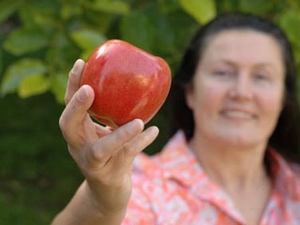 his time of year, gardeners across the country are either already harvesting fruit and vegetable crops, or are eagerly awaiting the first harvest of the season. While we hear stories about people's gardens producing so much zucchini that they fill neighbors' cars with it as a prank, unfortunately an increasing number of gardeners are experiencing lower yields of fruits from their gardens. Why would a plant flower, and then not bear fruit? How can it be remedied?
his time of year, gardeners across the country are either already harvesting fruit and vegetable crops, or are eagerly awaiting the first harvest of the season. While we hear stories about people's gardens producing so much zucchini that they fill neighbors' cars with it as a prank, unfortunately an increasing number of gardeners are experiencing lower yields of fruits from their gardens. Why would a plant flower, and then not bear fruit? How can it be remedied?One of the reasons that plants do not produce fruit is inadequate pollination. A major sign of inadequate pollination is when plants produce plenty of flowers, but barely any fruit. Most food crops require pollination in order to either produce fruit, or to produce seeds. Squash, zucchini, melons, cucumbers, apple trees, and almond trees are examples of plants that rely heavily on pollinators in order to produce fruit.
It's important to attract pollinators to your garden by establishing a bee-friendly landscape. Pollinators like native, perennial plants. Bee source published a great chart of nectar and pollen plants, organized by region. It's a good idea to consult with either an agricultural extension expert, or member of your local native plants society, in order to find out which plants will be most beneficial. Part of the plan needs to be planting a garden that blooms in all four seasons, including in winter. If you suspect that your plants are not being pollinated by natural pollinators, you should look into manual pollination.
Another reason why your plants might be under-producing is the weather. Unusually hot, cold, dry, or wet conditions can interfere with fruit production. Wind and heat can dry out soil and scorch plants. Excess moisture can cause mold and fungus growth on plants, and can attract and keep certain pests around. Frost can damage the flower buds and blooms of fruiting plants to the extent that the plants will not bear fruit. You might need to be protecting plants in cold weather, or watering them more if they're getting brown in high heat.
Excessive or inadequate fertilization is another reason why plants have smaller, or no, yields of fruit. Before fertilizing a garden, it is important to have a soil analysis done by your local cooperative extension, so that you know which nutrients your soil needs, and which nutrients it is already rich in. If soil analysis is not a possibility for you, consider simply layering a small amount of compost under mulch, like straw. Compost and straw mulch improve the quality of most home gardens. To avoid over-fertilizing, go light on the compost and heavier on the straw mulch. Cover crops can also restore nutrients to tired soil.
Good luck getting your plants to produce fruit!





